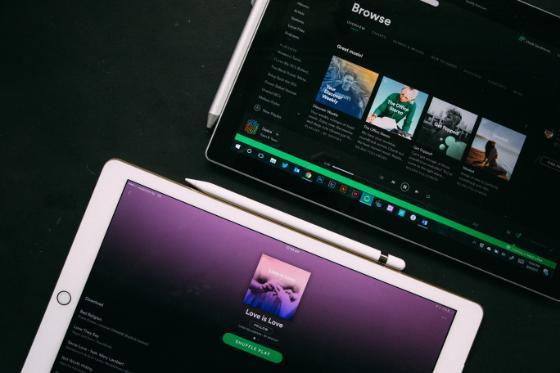4th February 2022
Podcasts or Bust! Should we #deletespotify?

Let's set the stall out straight away, Spotify has been a music streaming platform that has and it's no exaggeration to say has played an influential role in the music industry. Platforms like Spotify brought many aspects of the music industry back from the brink of collapse as we saw the rise of illegal streaming pave the way for people to consume music differently. Whether you stream music through Spotify or not, you know what it is, but what you think it is, is changing.
Who now has the power? The Musician or The Podcaster?
A week ago you might have said it was the podcaster, but this week you might say it is the musician. Confusing right? Yep!
It's been a turbulent week at Spotify. Despite reporting fourth-quarter results that mostly beat expectations, its stock plunged after the company projected weaker-than-expected user growth in the new year. Meanwhile, CEO Daniel Ek said it's too early to tell whether a recent artist boycott tied to the controversy involving podcast host Joe Rogan is impacting its business. But some artists say their beef with Spotify "runs deeper than Rogan." They point to the streamer's meagre artist compensation as the company pours hundreds of millions into podcasting.
Last week, Neil Young issued an ultimatum to Spotify: keep Joe Rogan or me. It can’t have both on the service. “I am doing this because Spotify is spreading fake information about vaccines — potentially causing death to those who believe the disinformation being spread by them,” he wrote in a now-deleted letter.The chief issue, he said, is Joe Rogan, Spotify’s star podcaster to whom it reportedly paid up to $100 million for an exclusive license to his show. Neil Young made good on his word and, along with his record label, removed his music from the service.
This marks a critical turning point in Spotify’s company narrative. It’s no longer a music company but one committed to podcasting to the point that it’ll compromise relationships with musical artists to ensure its strategy’s success.
Who was Spotify going to pick: a musician whose heyday was decades ago or a comedian who causes PR headaches but also commands a minimum ad spend of $1 million?
I’m processing the situation in a couple of ways, but one is assessing the economic incentives. Spotify’s thinking is obvious. What does losing Young mean? The company’s not financially dependent on his streams or subscribers — Drake or Taylor Swift might be a different story — and barring a mass exodus of subscribers over his missing catalogue, things remain business as usual. In fact, the company loses money every time someone streams Young’s songs, which is why Spotify wanted to get into podcasting in the first place. It makes money every time someone listens to Rogan.
The music artist within me could blog for hours about the pros and cons of Spotify, personally, I see the benefits for the consumer, but I have seen first-hand musicians financially crippled through the lack of royalties. Artists are paid between $0.0033 and $0.0054 every time their song is played, according to Business Insider. By another metric, according to data that the rapper T-Pain tweeted in December, it takes the average artist roughly 315 streams of a song to earn $1 from Spotify.
In 2014, "Wake Me Up" was the most streamed song in Spotify's history. The combined total of domestic royalties for those streams? $12,359. Maybe Aloe Blacc, was trying to tell us something, I will leave you with his track, and maybe wake me up too, when this is all over.
https://www.youtube.com/watch?v=M_o6axAseak
-ends-
By Louis Gray, head of department of management and leadership, University of Wolverhampton Business School


/prod01/wlvacuk/media/departments/digital-content-and-communications/images-18-19/iStock-163641275.jpg)
/prod01/wlvacuk/media/departments/digital-content-and-communications/images-2024/250630-SciFest-1-group-photo-resized-800x450.png)
/prod01/wlvacuk/media/departments/digital-content-and-communications/images-18-19/210818-Iza-and-Mattia-Resized.jpg)
/prod01/wlvacuk/media/departments/digital-content-and-communications/images/Maria-Serria-(teaser-image).jpg)
/prod01/wlvacuk/media/departments/digital-content-and-communications/images-2024/241014-Cyber4ME-Project-Resized.jpg)
/prod01/wlvacuk/media/departments/digital-content-and-communications/images-18-19/210705-bric_LAND_ATTIC_v2_resized.jpg)